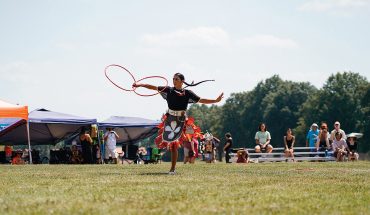 by Todd Cohen
by Todd Cohen
photograph courtesy of Jill Staton Bullard
As executive director of the Inter-Faith Food Shuttle, which she co-founded in 1989, Jill Staton Bullard heads a nonprofit that last year collected more than 7.1 million pounds of food from farmers, grocers and wholesalers, prepared it, and distributed it to agencies that serve needy people. The agency also trains underserved people to grow, prepare and cook healthy food.
Staton, a native of Winston-Salem who has lived in Raleigh since 1987, is an ordained deacon who serves St. Philip’s Episcopal Church in Durham.
What is your earliest giving memory?
My parents modeled being active in the community. They did everything from being a den mother, serving as PTA president, and helping with all of our plays at school, building scenery. My dad was always busy in the Lions Club, and with Young Democrats. There was not a separation between our family and the life of the community.
What did you want to be when you grew up?
I always wanted to be a teacher. I was raised in the Catholic Church. The life of service was something that was just part and parcel of my mindset.
What inspired you to begin the Food Shuttle?
It started with 11 breakfast sandwiches. I was in a fast food restaurant picking up sandwiches and coffee for soccer team parents. All the breakfast sandwiches on the shelf behind the cashier were thrown into the trash because it was time to put out lunch. We were raised by Depression-era parents. You didn’t throw away food.
How did you get started?
In the beginning, by collecting fresh local food that was being thrown away. But we learned that just putting food on the plate ever changed the paradigm of the people in need.
What did you do?
We started taking fresh food directly to people who needed food immediately. We started the culinary job-training program. We have a job-placement counselor, a job coach on staff. Close to 400 people have graduated and gotten jobs.
What else does the Food Shuttle do?
We collect and distribute food. We stabilize it, taking perishable product, then cook it and serve it hot or cold, or freeze it and distribute it frozen. And we teach people culinary skills. But we also teach them life skills and job skills and all the things they need.
How extensive is the problem of hunger here?
People are hungry for two reasons. They don’t have access to food, or they don’t have sufficient income to purchase food. In North Carolina, one in five children under age 18 goes hungry. And in the Triangle, one in four children under age 5 goes hungry.
What role do volunteers play?
They drive trucks and recover food. They distribute food. They do cooking classes and shopping classes. They’re in community gardens. They’re helping in young-farmer training.
How can people get involved as donors or volunteers?
Call or visit www.foodshuttle.org.
What are your plans for the future?
To construct a vigorous and healthy local food system. We are helping people grow food and cook that food to be healthy. We’re using food as a way to empower people to earn incomes. We have three urban agricultural training centers that will open this fall.
What have you learned along the way?
We’re strongest when we’re bound together. We’ve always got to be learning and teaching. You don’t have to be a college graduate to succeed; you just have to be persistent in what you want to do, and learn, learn, learn.
Whom do you admire?
My childhood hero was Albert Schweitzer. This was a man who could have been anything he wanted in a thousand different careers, and he chose to pour himself out for people who had no relationship to him. That’s where he found his greatest joy. He always will be my hero.
Whom do you admire in Raleigh?
Vernon Malone (the former state senator and member of the Wake County Board of Commissioners who died in 2009). He worked all of his life on behalf of a city he loved, and a city that was not always good to him. Vernon said to me in 1991 that he grew up in downtown Raleigh and he might have been poor, but he never knew it. People took care of each other because they could take care of each other.
What are you reading?
Last Child in the Woods. It’s really about children who are not exposed to nature or food. We’ve become inside people instead of outside people.
What inspires you?
People who are passionate about what they want and persist towards making things happen. Of the traits I have learned that make the biggest difference, it’s persistence. You’ve just got to keep on keeping on.
What is your philosophy of life in one sentence?
We were put here to take care of the earth and to be part of the earth and to take care of each other.
What makes an effective giver?
I love an informed giver who knows what difference their dollar makes. But as long as we are giving, we are doing what we are supposed to.
If you weren’t working at the Food Shuttle, what would you be doing?
I’d probably be doing things about fresh water and the environment. The water situation is probably the most critical thing we have going in the planet.



